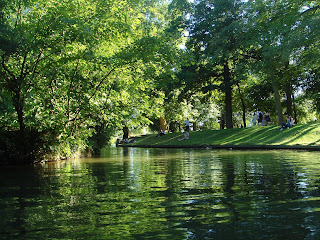Three texts I read recently, which have one word in common.
Charles Fairfax Murray, 'The Last Parting of Helga and Gunnlaug'
I
An anonymous fifteenth-century carol, from the manuscript Cambridge University Library MS. Additional 5943:
Wolde God that hyt were so
As I cowde wysshe bytuyxt vs too!
The man that I loued altherbest
In al thys contre, est other west,
To me he ys a strange gest;
What wonder est thow I be woo?
When me were leuest that he schold duelle,
He wold noght sey onys farewelle;
He wold noght sey ones farewell
Wen tyme was come that he most go.
In places ofte when I hym mete,
I dar noght speke, but forth I go;
With herte and eyes I hym grete;
So trywe of loue I know no mo.
As he ys myn hert loue,
My dyrward dyre, iblessed he be;
I swere by God, that ys aboue,
Non hath my loue but only he.
I am icomfortyd in euery side;
The coloures wexeth both fres and newe;
When he ys come and wyl abyde,
I wott ful wel that he ys trewe.
I loue trywely and no mo;
Wolde God that he hyt knywe!
And euer I hope hyt schal be so;
Then schal I chaunge for no new.
In 1418 this manuscript belonged to a man named John, a Carthusian monk at the priory of Hinton, Somerset; it also contains a version of the poem ‘
Ecce ancilla domini’, which features a line about another memorable 'guest'. Unusually, in the manuscript a different hand has gone through and added feminine pronouns in place of each 'he' in this poem, between the lines of every verse.
[Would to God that it were so
As I could wish betwixt us two!
The man that I loved of all the best
In all this land, from east to west,
To me he is a strange guest;
What wonder is it though I be woe?
When most I wanted him to dwell,
He would not say once farewell;
He would not say once farewell
When time was come that he must go.
In places oft when I him meet,
I dare not speak, but forth I go;
With heart and eyes I him greet;
So true of love I know no mo. [other]
As he is my heart's love,
My dearest dear, blest may he be!
I swear by God that is above,
None hath my love but only he.
I am comforted on every side;
The colours wax both fresh and new;
When he is come and will abide,
I'll know full well that he is true.
I love him truly, and no mo;
Would to God that he it knew!
And ever I hope it shall be so;
Then shall I change him for no new.]
II
'Estrangement'
William Watson (1858-1935)
So, without overt breach, we fall apart,
Tacitly sunder — neither you nor I
Conscious of one intelligible Why,
And both, from severance, winning equal smart.
So, with resigned and acquiescent heart,
Whene'er your name on some chance lip may lie,
I seem to see an alien shade pass by,
A spirit wherein I have no lot or part.
Thus may a captive, in some fortress grim,
From casual speech betwixt his warders, learn
That June on her triumphal progress goes
Through arched and bannered woodlands; while for him
She is a legend emptied of concern,
And idle is the rumour of the rose.
III
From
Persuasion, ch.8:
From this time Captain Wentworth and Anne Elliot were repeatedly in the same circle. They were soon dining in company together at Mr Musgrove's, for the little boy's state could no longer supply his aunt with a pretence for absenting herself; and this was but the beginning of other dinings and other meetings.
Whether former feelings were to be renewed must be brought to the proof; former times must undoubtedly be brought to the recollection of each; they could not but be reverted to; the year of their engagement could not but be named by him, in the little narratives or descriptions which conversation called forth. His profession qualified him, his disposition lead him, to talk; and "That was in the year six;" "That happened before I went to sea in the year six," occurred in the course of the first evening they spent together: and though his voice did not falter, and though she had no reason to suppose his eye wandering towards her while he spoke, Anne felt the utter impossibility, from her knowledge of his mind, that he could be unvisited by remembrance any more than herself. There must be the same immediate association of thought, though she was very far from conceiving it to be of equal pain.
They had no conversation together, no intercourse but what the commonest civility required. Once so much to each other! Now nothing! There had been a time, when of all the large party now filling the drawing-room at Uppercross, they would have found it most difficult to cease to speak to one another. With the exception, perhaps, of Admiral and Mrs Croft, who seemed particularly attached and happy, (Anne could allow no other exceptions even among the married couples), there could have been no two hearts so open, no tastes so similar, no feelings so in unison, no countenances so beloved. Now they were as strangers; nay, worse than strangers, for they could never become acquainted. It was a perpetual estrangement.






